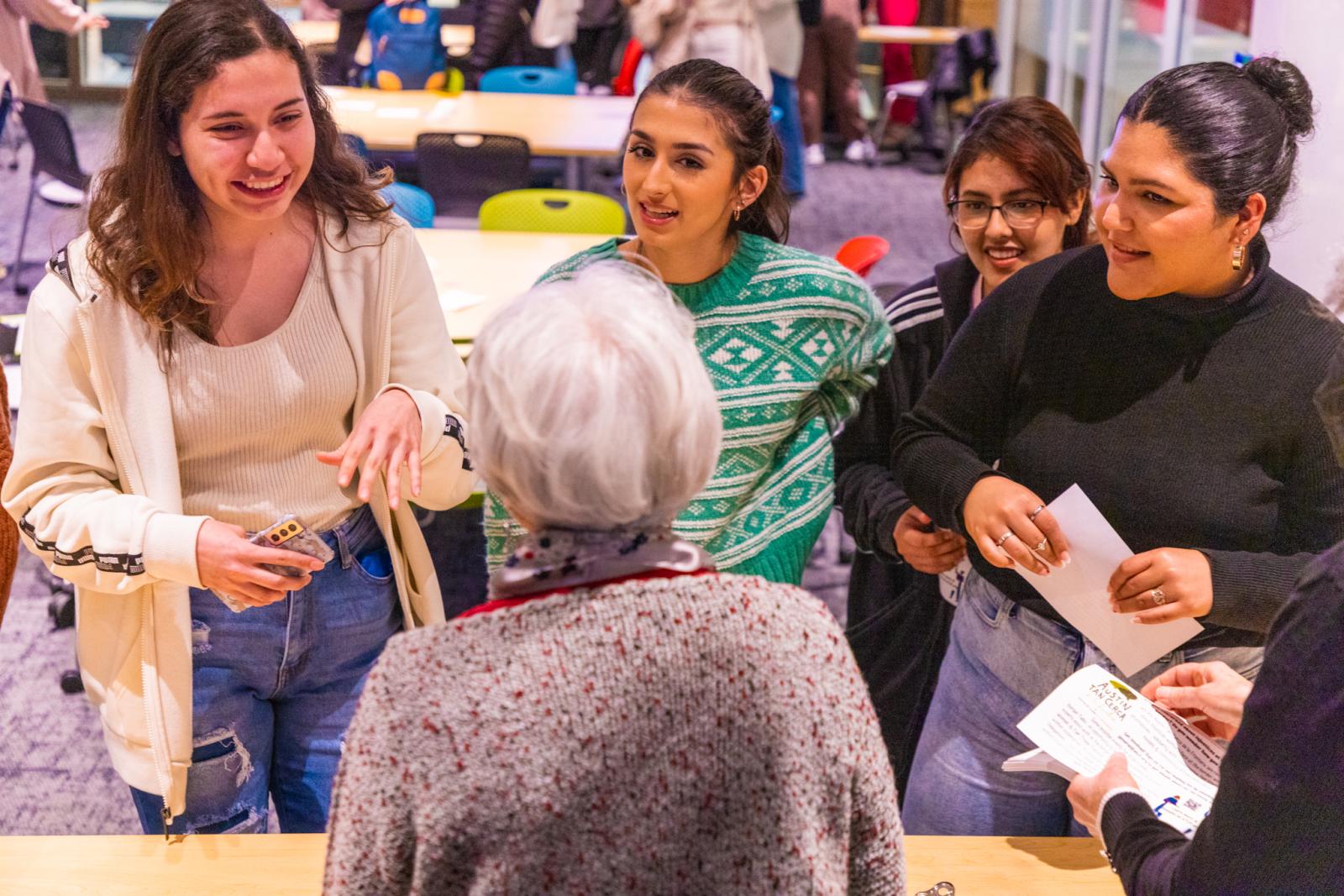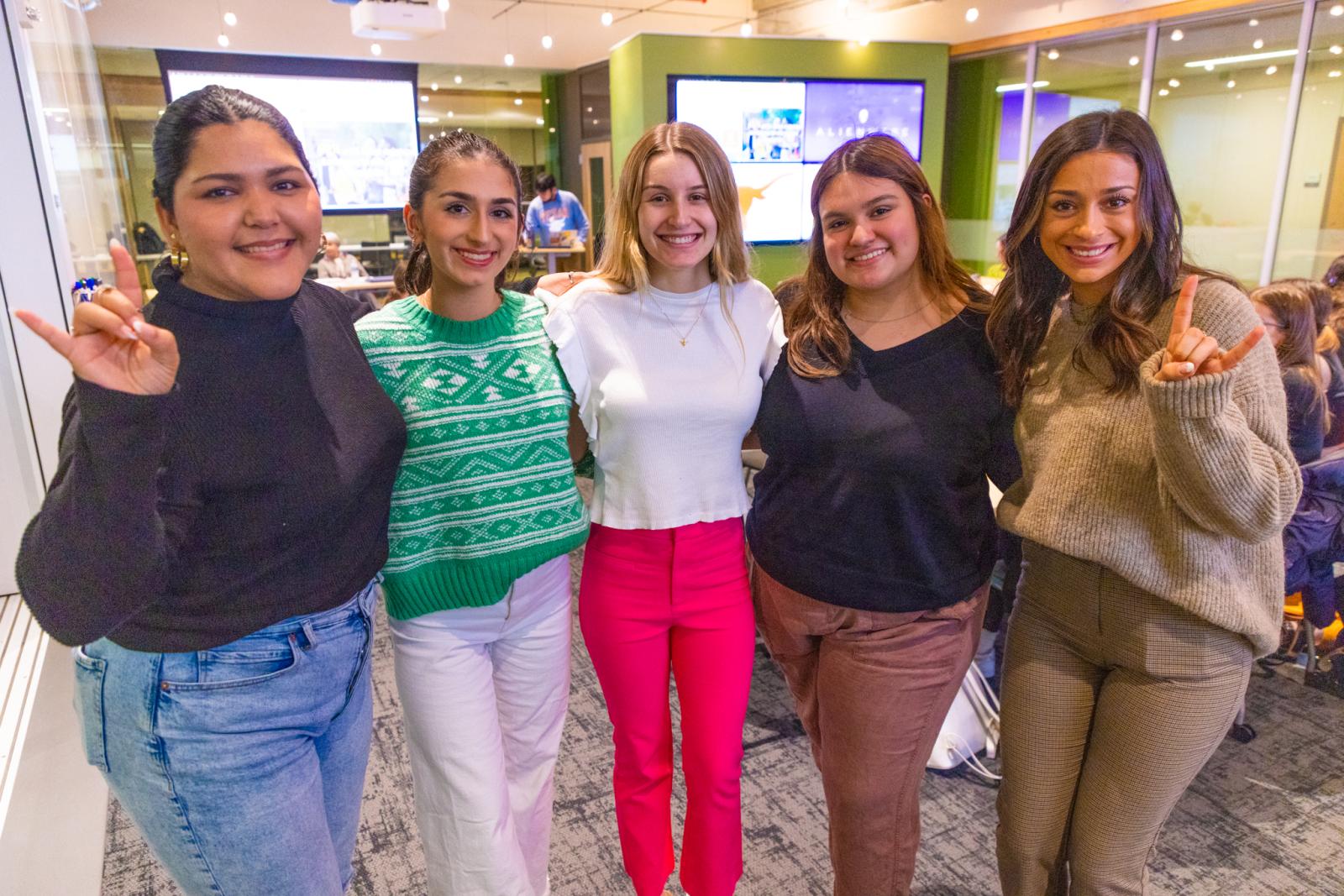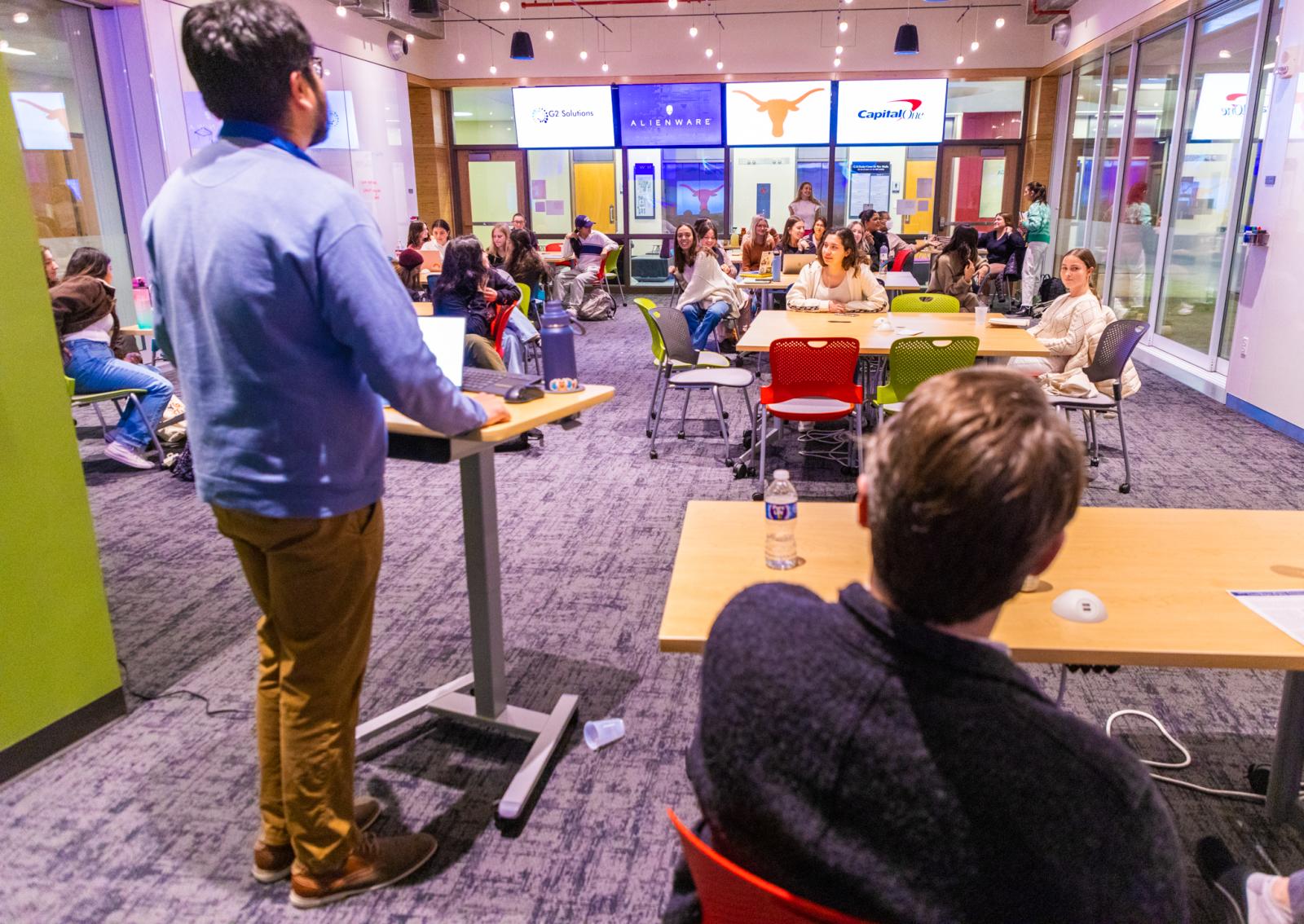Making Moody More Media Literate

More than half of U.S. adults today get their news primarily through social media, whether it’s scrolling Twitter, clicking that link your aunt’s mom posted on Facebook or watching a 15-second clip on TikTok.
While these platforms put the world at our fingertips, they are quickly becoming spaces where false news spreads as quickly as it takes to hit the “share” button, sometimes inadvertently, when well-meaning people fail to check facts, and sometimes intentionally, when bad actors deliberately spread false information to incite panic or create distrust.
Mis- and disinformation, the former and latter, respectively, have become hot button words in recent years because of the prevalence and severity of the problem online.
This semester, a team of six Moody College PR majors set out to educate college students about the issue — and hopefully help them become more cautious when consuming news — as part of a public relations campaign for the 2023 Bateman Case Study Competition.

The Bateman competition, held annually by the Public Relations Student Society of America, or PRSSA, gives students an opportunity to implement and evaluate a public relations campaign for a real client, including planning content, pitching media and holding events, all while competing for the top $3,500 prize. More than 75 teams enter the competition each year. This was UT Austin’s first time participating.
“For our students, this was an opportunity to pull together the different parts of the PR curriculum that seem so widely different and actually apply the knowledge to helping solve a wicked problem,” said Natalie Tindall, director of the Stan Richards School of Advertising & Public Relations a mentor to the Bateman team. “In a lot of campaigns classes, you plan, project and explain what a client should do. With Bateman, you actually carry out the campaign, measure it, find out if it was successful, if it changes peoples’ opinions and causes them to stop and question, ‘Maybe I shouldn’t retweet this thing from CNN.’ You don’t get many cases to run experiments like this in the real world, especially with a paying client. So this is a great testing ground. Even if you fail, you still learn something.”
This year’s client, chosen by PRSSA, was the News Literacy Project, a nonprofit dedicated to helping people become more discerning news consumers, including by providing toolkits to educators and a learning platform to help people spot mis- and disinformation.
The Moody team, which included public relations majors Paola Hernandez, Anika Grendell, Rhee Breheny, Georgina Vargas, Mary McKenny and Eva Nassery, decided to focus their efforts on reaching Latinx college students, since Texas has a high Latino population.
Misinformation is a particular threat to Latino communities since they spend more time with almost all social media and messaging services than the general population, according to a 2021 Nielsen study. This is largely because of the community feel of these apps and the ability to connect family and friends across the U.S. and abroad.
The UT Austin team spent last fall conducting research to better inform the campaign, looking at the mission of the News Literacy Project, along with social media, demographic and technographic data, to see how disinformation affects different races and ages. They also did primary research, conducting interviews with their target audience.
Vargas said most of the people they interviewed could often not tell the difference between real and fake information. “It motivated us even further to pull through with the campaign.”
Through their interviews and research, the team refined the direction for their campaign, coming up with the tagline “L.I.T.,” or Look. Investigate. Teach., indicating ways people can protect themselves from mis- and disinformation.
The first step, to look, is to determine what kind of content you are looking at, whether it’s news, opinion or advertising. The second step is to investigate with “lateral reading,” or looking for articles on the topic by other authors to fact-check or become more informed. And finally, teach. When you find out information your family and friends have shared on social media is false, it can be important to educate them with tact and grace.
The team started building a website with educational resources and an event calendar. They made the option for viewers to toggle between English and Spanish, something Grendell said was important considering their target market. “I think it’s important to think about who your consumer is and the barriers they might face when consuming your content,” she said. “Then start breaking down some of those barriers.”
The team also set up social media accounts and hired two influencers, Chantal Flores, the campus brand manager for HBO Max, and Leo Zapata, a local realtor, both with large social media followings, to help spread the word about their campaign and news literacy.
The official campaign kicked off Feb. 5, with two events and a tabling event. The team had to scramble a bit to keep things on track after losing power and precious time in the latest Texas winter storm.
For their panel event Feb. 16, the team invited Janet Cook and Josefina Castillo from Austin Tan Cerca de la Frontera, a nonprofit that raises awareness of social injustice on the U.S.-Mexico border, and Journalism and Media Assistant Professor Sam Woolley, an expert in mis- and disinformation, to share their wisdom about becoming news literate in a world increasingly plagued by false information.

“No matter where you go to work, you’re going to encounter mis and disinformation. That’s just the reality of today’s world. Everything you read comes with a specific perspective,” Woolley said to a crowd of two dozen students at the event. “Think carefully about what you share on social media.”
The team also hosted a Lotería night in the Texas Union, inviting student organizations like Texas Huego, PRSSA and HPRSSA, the Hispanic chapter of PRSSA to participate. Lotería is a Mexican card game similar to bingo, and to mix things up, the team attached a different fact about mis- and disinformation to each card. They gave out prizes, socialized and enjoyed barbecue.
“The events are the hardest part,” Vargas said. “You plan them for months before. Then, the week it actually comes, it’s so stressful. We forget we’re students honestly. It is a very time-consuming thing to pull through.”
Despite the stress, the team unanimously agreed the work was extremely rewarding, and a one-of-a-kind educational experience.
“You hear about what PR is in a textbook, the planning that goes into a campaign,” Vargas said. “But it honestly went in one ear and out the other for me because I wasn’t able to practice it. Now I was actually able to sit down and have a mentor work one-on-one with me and put into practice all the skills we have learned. This is my third year here, but this is my first experience where I have really grasped PR.”
It's what Tindall was hoping to accomplish when she brought Bateman to UT this year.
“I always choose to do Bateman in years not when it has to do with a cause not a company,” she said. “For students, being able to work on something like this is different than trying to sell more staplers or fizzy drinks to people. They see that this is very important and affects communities in different ways. There are small and large things we can do to change behaviors and attitudes.”
The team has since pulled down its website and social media accounts, a requirement from the Bateman Competition when the campaign concludes.
To wrap things up, the team was required to compile a research book to send to the News Literacy Project, which includes data collected from their events, social media and website, to track the effectiveness of the campaign.
Bateman is expected to announce the winners in the coming months.
“Of course, I want to win,” Tindall said. “But if I can have students walk away with an idea, something they are really passionate about, something tangible that they can put on their resume, walk away saying I did my best, I am happy.”
Tindall admitted she got emotional thinking about the team’s hard work this year. “These young women did everything I asked them to do, and I have to applaud that and be thankful for that. They went above and beyond what I would have expected.”
Tindall hopes to continue the Bateman tradition at Moody, and the team is recommending it for all future PR majors.
“We hope it becomes a legacy,” Vargas said. “Yes, it was hard, time consuming. Our team has admitted a few times we wanted to quit. But we pushed through. This is an experience unlike no other. You aren’t getting graded on it. You aren’t going to risk getting fired if you don’t do something right. We really are here to learn.”
